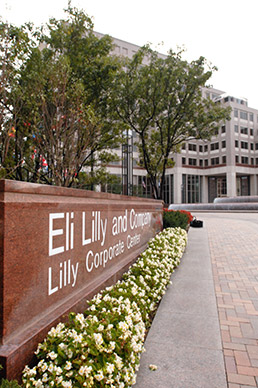Subscriber Benefit
As a subscriber you can listen to articles at work, in the car, or while you work out. Subscribe Now
A proposal that would have weakened Eli Lilly and Co.’s defenses against an unwanted takeover failed to pass April
19 at the company’s annual meeting of shareholders.
The proposal to remove an 80-percent approval threshold for takeover bids against the wishes of Lilly’s board received
approval from shareholders owning 74 percent of Lilly’s shares.
But to pass, the proposal needed the approval of investors holding 80 percent of Lilly’s outstanding shares.
The big hurdle was that nearly 15 percent of Lilly shares were not voted at all on the measure. Among those shares voted,
nearly 85 percent voted to remove the high threshold on hostile takeovers.
The company staged its annual meeting at its headquarters hours after announcing first-quarter financial results. Lilly posted
profit of $1.3 billion, down 5 percent from the same quarter a year earlier. Per-share earnings were $1.13 compared with $1.20
a year ago.
Dragging down results were higher selling costs and a hefty charge related to the recently passed health reform law.
“The good news is that Lilly performed well operationally this quarter,” Goldman Sachs analyst Jami Rubin said
in a report.
At the annual meeting, shareholders also failed to pass a proposal to make governance more shareholder-friendly by electing
directors annually. Directors now serve three-year terms. It received nearly 75-percent approval.
The supermajority vote requirement, which has been in place for 25 years, applies not only to outright takeover bids, but
also to measures used to achieve them, such as removing directors before their terms end or expanding the size of the board.
If the proposal had passed, it would have required a bare majority of votes to approve such actions in the future.
This is the fourth consecutive year the proposal has been made at Lilly’s shareholders meeting, but it is the first
year the measure has been supported by Lilly’s board.
That support clearly made a difference. The measure had received no higher than 57-percent support before.
Investors generally favor low barriers to takeover because an acquiring company almost always pays a premium price to entice
shareholders to approve a merger.
Lilly’s board, which has been fiercely independent during multiple waves of consolidation in the pharmaceutical industry,
changed to support the measure because of its popularity among shareholders.
“While it is important to the company’s long-term success for the board to maintain appropriate defenses against
inadequate takeover bids, it is also important for the board to maintain shareholder confidence by demonstrating that it is
responsive and accountable to shareholders,” read a statement from Lilly’s board in the company’s proxy
statement.
The board members noted in the proxy that the laws of Indiana still provide protection against unwanted takeovers.
Indiana’s laws have been mimicked by many other states, but remain among the 10 most stringent, said Diane Denis, a
corporate mergers and governance expert at Purdue University’s Krannert School of Management.
The five key provisions of Indiana’s laws are:
• A shareholder that acquires a controlling stake must receive approval from the majority of other shareholders before
exercising the full voting power of that stake.
• A bidder that acquires a controlling stake must wait several years before being allowed to enter a merger agreement
with the company.
• Specific procedures must be followed to determine a fair price for the company’s shares.
• Corporate boards are allowed to consider the interests of non-shareholders, such as employees or the local community,
in rejecting a takeover bid.
• Poison pills, which turn non-voting shares into voting shares when a hostile bid is launched, are approved by state
law.
The statement from Lilly’s board in the proxy specifically noted that Indiana law would help “to discourage a
would-be acquirer from proceeding with a proposal that undervalues the company.”
Four proposals by Lilly shareholders that were opposed by management—most of them seeking more input on executive compensation—all
failed to gain approval of the majority of shares voted at Monday’s meeting.
Lilly CEO John Lechleiter received one question from a shareholder about whether the company would be able to keep paying
its dividend of $1.96 per share per year. Concerns about the dividend—which totals $2.1 billion a year—have risen
as Lilly moves closer to a period where five of its top-selling drugs will have their sales sapped by cheaper generic versions.
In response, Lechleiter said, “We must navigate the waters up ahead, but as we do that our intention is to maintain
our dividend.”
Maintaining the dividend, but not raising it, would break a 42-year streak of increases.•
Please enable JavaScript to view this content.

